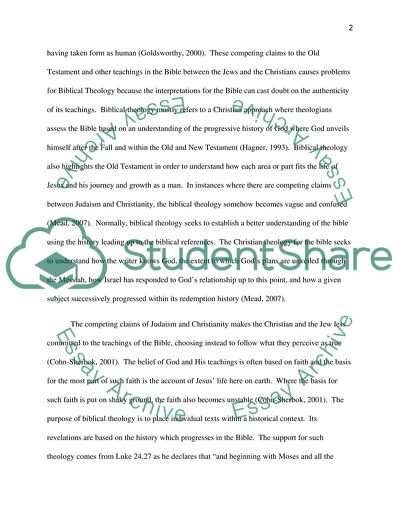Cite this document
(Problems for Biblical Theology Assignment Example | Topics and Well Written Essays - 4000 words - 1, n.d.)
Problems for Biblical Theology Assignment Example | Topics and Well Written Essays - 4000 words - 1. https://studentshare.org/religion-and-theology/1788278-how-do-competing-jewish-and-christian-claims-to-the-old-testament-create-a-problem-for-biblical-theology-is-there-a-solution-to-this-problem
Problems for Biblical Theology Assignment Example | Topics and Well Written Essays - 4000 words - 1. https://studentshare.org/religion-and-theology/1788278-how-do-competing-jewish-and-christian-claims-to-the-old-testament-create-a-problem-for-biblical-theology-is-there-a-solution-to-this-problem
(Problems for Biblical Theology Assignment Example | Topics and Well Written Essays - 4000 Words - 1)
Problems for Biblical Theology Assignment Example | Topics and Well Written Essays - 4000 Words - 1. https://studentshare.org/religion-and-theology/1788278-how-do-competing-jewish-and-christian-claims-to-the-old-testament-create-a-problem-for-biblical-theology-is-there-a-solution-to-this-problem.
Problems for Biblical Theology Assignment Example | Topics and Well Written Essays - 4000 Words - 1. https://studentshare.org/religion-and-theology/1788278-how-do-competing-jewish-and-christian-claims-to-the-old-testament-create-a-problem-for-biblical-theology-is-there-a-solution-to-this-problem.
“Problems for Biblical Theology Assignment Example | Topics and Well Written Essays - 4000 Words - 1”. https://studentshare.org/religion-and-theology/1788278-how-do-competing-jewish-and-christian-claims-to-the-old-testament-create-a-problem-for-biblical-theology-is-there-a-solution-to-this-problem.


